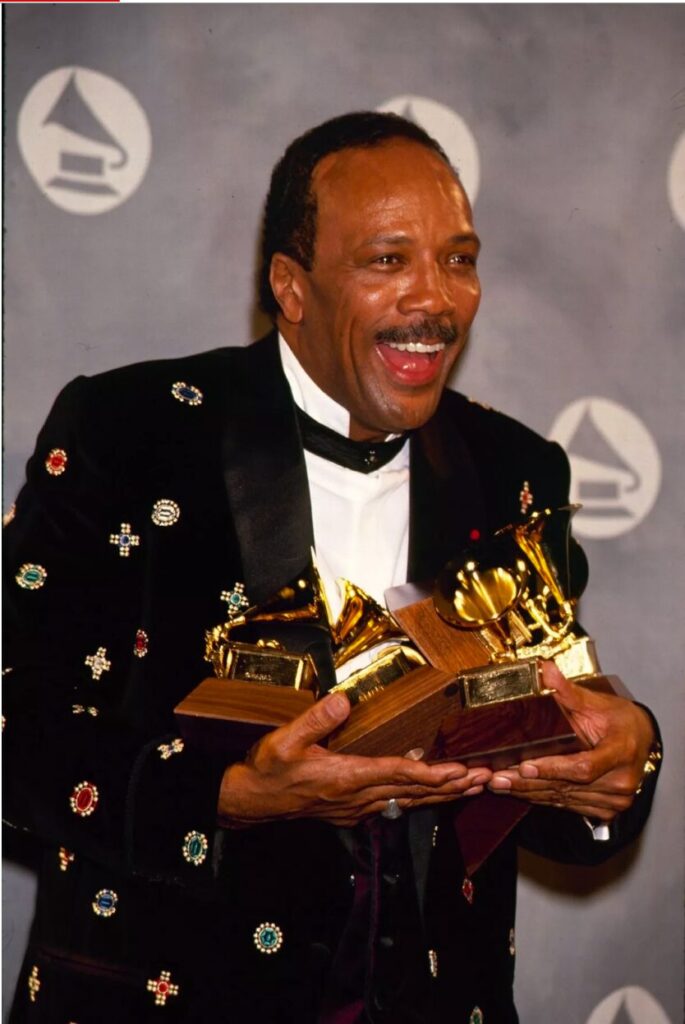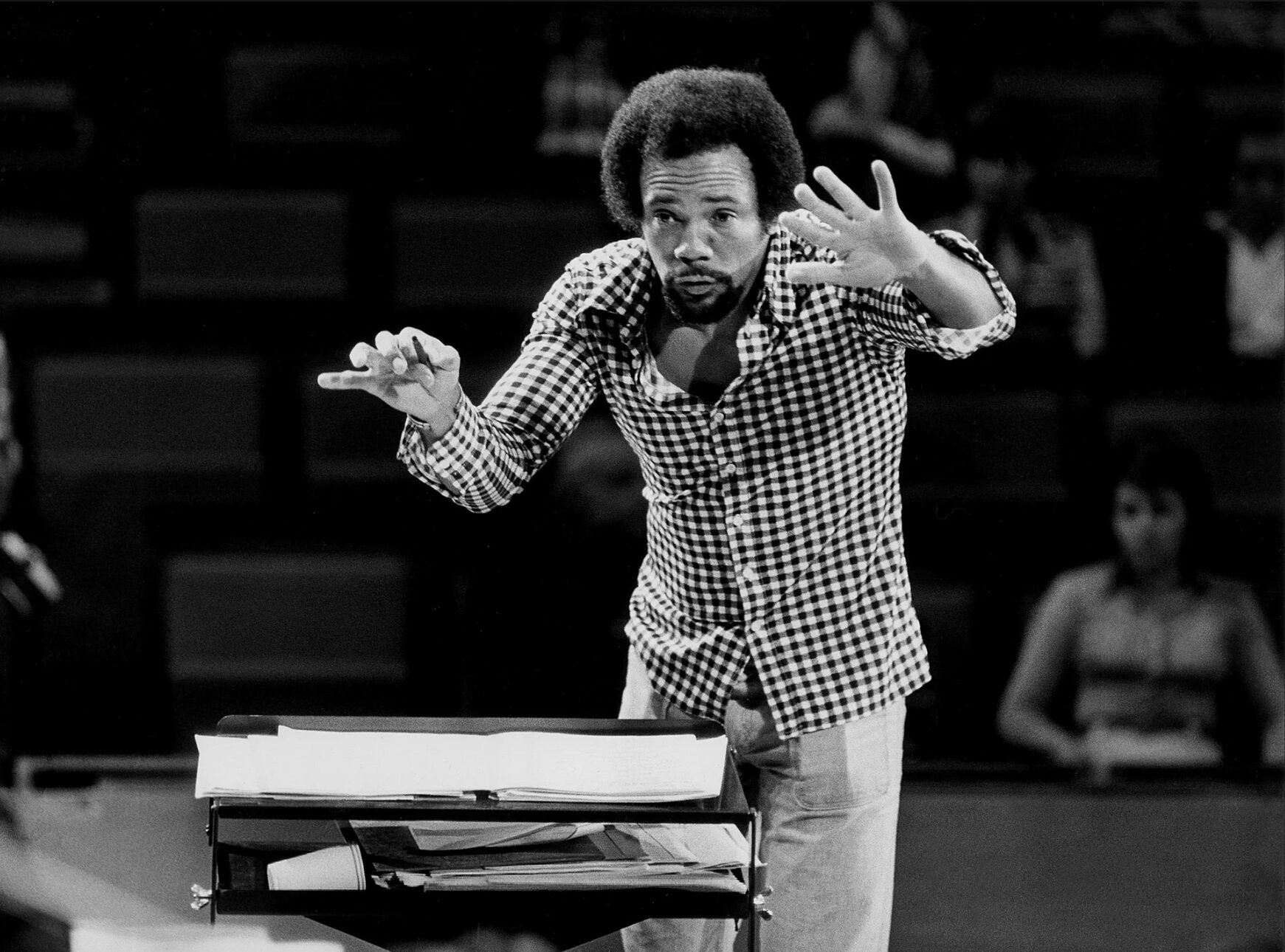These days, when it seems like many of our greats are being called on to glory, it can sometimes feel like the terms “Legend” and “Goat” get thrown around like confetti. But there are some people whose contribution to the culture extends far beyond words. On Sunday, November 3rd, we lost our beloved Quincy Jones, who passed away at home, surrounded by his loving family. Quincy Jones IS the blueprint for Black music production and one of the greatest storytellers this generation has ever heard. He was a pioneer of sound whose work stretched across many genres and an icon who lived many lives. He was born in 1933, in the heart of the Southside of Chicago, where he first fell in love with music at a very young age while growing attached to a next-door neighbor’s piano. His mother was diagnosed with Schizophrenia and sent away to a mental institution, with his parent’s divorce coming soon after. Once his dad remarried and got a job at a navy shipyard, they moved around a lot until finally settling in Seattle when Quincy was in high school. It was there that he began to refine his musical skills as a trumpet player and composer for Garfield High School and landed an opportunity to play with the National Reserve Band. His work ethic, undeniable talent, and experience landed him a scholarship at Seattle University as well as the Berklee College of Music in Boston. He was already operating in his destiny and laying out a path to his wildest dreams, and boy, are we glad he did.
At 14 years old he met a 16-year-old, Ray Charles, whom he has been directly quoted as saying had a huge impact on his career. Their lifelong bond gave Jones access to a whole new world. Jones discovered a new musical talent in Charles, who performed a blues, gospel, and R&B fusion he had never heard before. Charles, who has been blind since he was seven, encouraged Jones to pursue arranging and composition soon after the two began playing together. Aside from Charles, Quincy spent his early professional days working with heavy hitters like Dizzy Gillespie and Count Basie, and as the years went on, the names got bigger, and the list got longer. Yesterday’s price was no longer today’s price.
Quincy Jones’s work transcends music and film alike. The Color Purple, a highly regarded adaptation of Alice Walker’s Pulitzer Prize-winning novel, was produced and composed by him. In addition to the numerous honors he received during his career, his work earned him a nomination for an Academy Award. In 1977, he was hired as a music producer and musical supervisor to produce “The Wiz”, an urban adaptation of “The Wizard of Oz”, where he would reconnect with the artist that would eventually catapult his career to an entirely different dimension. Quincy Jones first met Michael Jackson when he was 12 years old, but they were later reintroduced on set when Jackson was cast as the Scarecrow in Jones’ latest project. He recalls having conversations with Jackson listening as he explained that he could hear fully formed songs in his head and needed someone to help write them down. MJ also disclosed to Quincy that he was working on his debut solo album at the time and was also in need of help finding a producer. The musical partnership between Michael Jackson and Quincy Jones would go on to change the trajectory of pop music as a whole and become one of the most influential collaborations in music history. Over the course of his unmatched career, Jones produced Michael Jackson’s three iconic albums, including his debut—Off the Wall, Thriller, and Bad—which not only broke sales records, and set brand new standards, but also revolutionized pop music. Jones’s ability to combine genres and experiment with sound is demonstrated by the fact that Thriller is STILL the best-selling album of all time.
When you hear the name, Quincy Jones, it almost always is synonymously mentioned with the names Michael Jackson and Ray Charles, but Quincy’s work spans time and age, giving a new meaning to “Keeping Up With the Joneses”. There are many artists who are still working today that attribute Jones to playing a huge role in the launch of their career. Through Quincy Jones we were introduced to Tevin Campbell, a talented kid radiating his Black Boy Joy through his debut hit “Tomorrow”, to the timeless hit “Can We Talk” which if we’re being honest, feels like it’s on its way to “Thriller” status as far as replay value is concerned. It was Quincy Jones, who put a move on our hearts with Tamia, who lowkey (high key) remains one of the most consistent vocalists of my generation. And through Quincy Jones, there would be no “Fresh Prince of Bel-Air”, which was the platform that amplified Will Smith beyond him being the very first Grammy award-winning rap artist, to his Oscar-winning, and extensively successful acting career.
Outside of the realm of his contributions to music and film, he was also a social activist devoted to helping underprivileged and marginalized communities. He produced the international hit “We Are the World,” which raised $60 million for famine relief in Africa in 1985, and he also co-founded the Institute for Black American Music and established the Quincy Jones Listen Up Foundation, which aims to give young people access to cultural and educational possibilities. He was an ardent supporter of several charitable groups, such as GLAAD, and the NAACP, and endless causes pertaining to LGBTQ+ and racial equality. Just as enduring as his artistic accomplishments is his legacy as a changemaker and a humanitarian.

In 2018 Netflix released a documentary that his daughter, actress Rashida Jones, created in an effort to chronicle his life’s experiences and it was during this time that we were exposed to the magic of his storytelling. He captivated us with tales of drinking “seven double Jack Daniels an hour” while hanging out at the Jazz clubs with Sammy Davis Jr. and Frank Sinatra who Jones said after he passed, left him a ring that Sinatra wore for 40 years, engraved with his families’ Sicilian crest. To the time Bono invited him to the Vatican to meet the pope. To how then, at 84 years old, he had 22 girlfriends, spoke 26 languages, and felt like he was “just getting started.” His stories were an adventure through time, history, and culture, inundated with unapologetic truth and intentional humor.
Quincy Jones left behind seven children and a large number of grandchildren. His family, his extensive body of work, and the generations of artists he influenced will all carry on his legacy.
When discussing the documentary in a 2018 interview with GQ he was asked “Do you ever wish you’d been a different way?”
His response? “Je ne regrette rien de tout. I don’t regret shit.”








